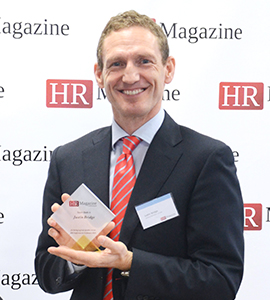
Justin Bridge, Head of Executive Development, Group Human Resources, Jardine Matheson Limited

Bridge pointed out that periods of uncertainty are often accompanied by great innovation. “If we go back to the turn of the twentieth century we find a period of turbulent change equal to anything we’re experiencing today. This gave rise to some of the most important innovations in human history. Marie Curie, Albert Einstein, Henry Ford, the Wright Brothers—all made their discoveries within a five-year period. People challenged what was ‘known’ and sought to do things that had never been done before.”
It is this notion of ‘not knowing’, which was behind one of the greatest success stories of the previous century—Henry Ford. According to Bridge, “Henry Ford introduced to the world mass production. He saw the future—he was the Elon Musk of the day. He knew that to do something that was never done before, the last thing he needed was so-called ‘experts’ who believed they knew what could and could not be done. Ford realised he needed people who were excited by what they didn’t know and he understood that ‘not knowing the answer’ was a source of opportunity rather than a weakness.”
How does this apply in the world of today? Bridge explained that it is a significant mind-set shift to embrace the concept of not knowing. “We tend to defer to the experts, but doing so inhibits innovation and fresh thinking. So how do we make it okay for managers to embrace ‘not knowing’ as a source of potential value?” Bridge admitted that is the big question. “We need to help our organisations see the potential in ‘not knowing’ and the value that can be derived from making mistakes. We all know we learn from our mistakes yet we spend a lot of time trying to avoid making them.”
Bridge believed what can help organisations tap into the value of ‘not knowing’ is great questioning and listening techniques. “Coaching is about exploring parts of your thinking you have never explored before. It is a way to encourage and enable people to think differently—I think this is a fundamental leadership skill in times of change. We also need to develop the ability to look ahead and anticipate change and its potential impact—practise going into the unknown before we actually get there.” One way to do this is to pull a diverse group of people together to elicit their ideas. As Bridge explained, “We need to ask ourselves, ‘What do we really mean by diversity?’ Typically this means people of different gender or ethnicity. But what about people who think differently? They may not ‘fit’ our corporate culture, but do we only want people who fit? Or do we want people who create value in ways other people can’t?’
According to Bridge, all of this goes against the grain, but that is what leadership feels like. “We spend too much time talking about the inspirational parts of leadership, and not enough time talking about the ‘gritty’ parts that are about challenging the status quo and creating positive change.”




